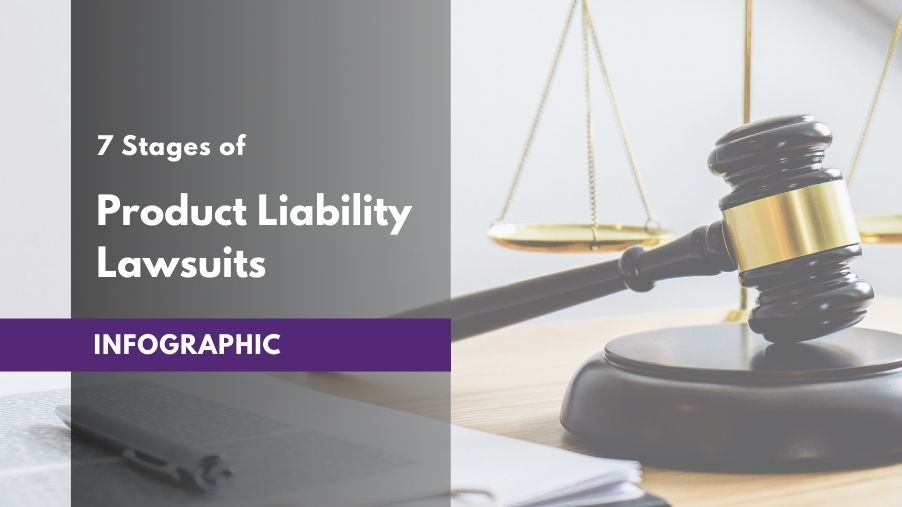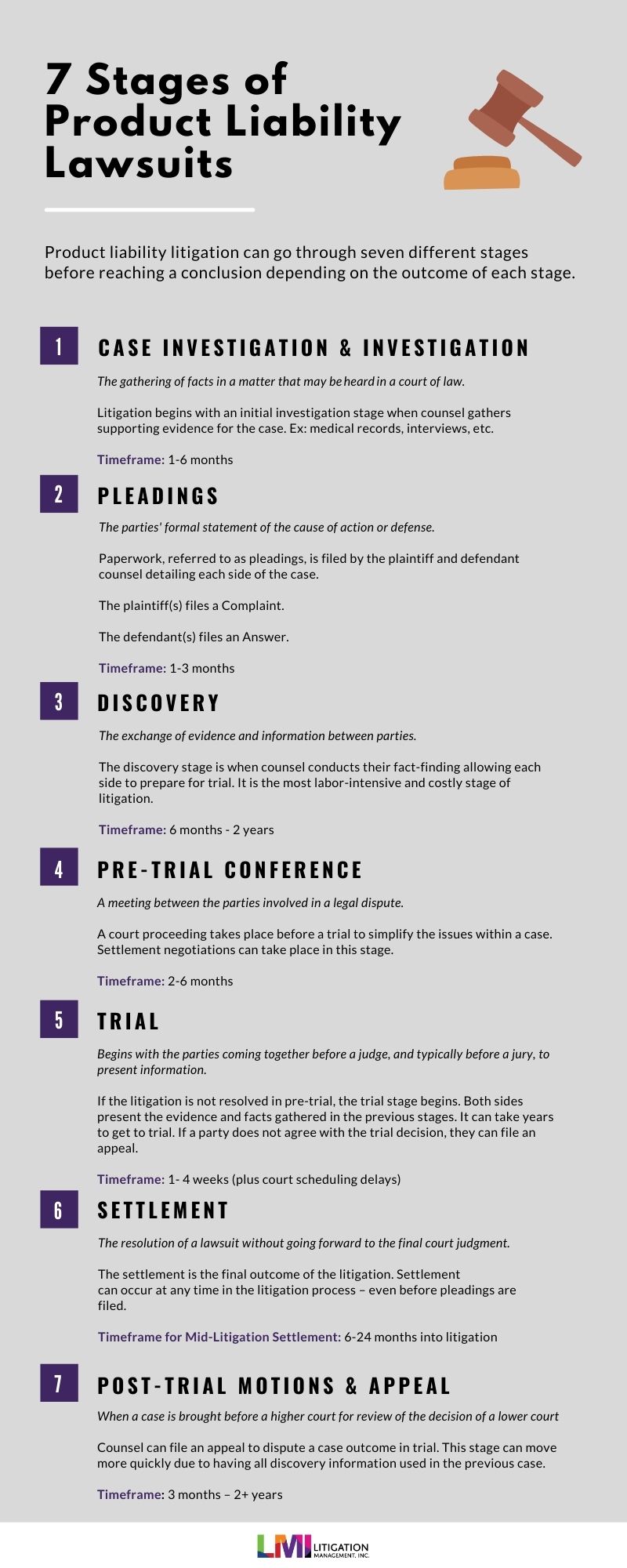
What is a product liability lawsuit?
A product liability lawsuit is a civil legal action in which a party seeks to hold a manufacturer, distributor, supplier, or retailer legally responsible for harm allegedly caused by a defective or unreasonably dangerous product.
The core allegation in a product liability case is that a product posed an unreasonable risk that led to injury, property damage, or other harm.
Product liability lawsuits span a wide range of industries and product types, from pharmaceuticals and consumer electronics to industrial machinery and automobiles. They’re handled in state and federal courts and often involve complex factual, scientific, and regulatory issues.
Understanding the Stages of Product Liability Cases
Product liability litigation plays a critical role in balancing consumer protection with corporate accountability. Whether representing plaintiffs, defending manufacturers, or evaluating claims internally, understanding the procedural stages of a product liability lawsuit is essential for effective case management and legal strategy.
This overview outlines the key phases and timeframes typically associated with each phase involved in a product liability case, offering a foundational reference for attorneys, in-house counsel, and legal support professionals.

1. Case Assessment & Investigation
The gathering of facts in a matter that may be heard in a court of law.
The litigation process generally begins with a detailed case assessment. Legal counsel reviews the facts to determine whether the alleged harm may be linked to a defect in design, manufacturing, or failure to warn. This phase involves collecting product documentation, medical records, expert input, and other evidence critical to evaluating legal exposure or the merit of a claim. For corporate counsel, this may also include internal incident reports and compliance reviews.
Timeframe: 1-6 months
It is becoming more common for the court to appoint a third-party data administrator to handle the coordination, collection, and analysis of the initial case information, which can impact the timeframe.
2. Pleadings
The parties’ formal statement of the cause of action or defense.
The paperwork filed by both plaintiff and defense counsel is referred to as pleadings. The pleadings detail each side of the case. Once a claim is deemed viable, the plaintiff files a complaint setting forth the factual allegations. The defendant is then served and typically responds with an answer or motion to dismiss. Early motion practice may challenge jurisdiction, sufficiency of the pleadings, or the applicability of defenses such as preemption or statute of limitations.
Product liability litigation involving many plaintiffs, who allege the same set of facts and alleged wrongdoing against the same defendant(s), will typically be categorized as a mass tort. In a mass tort, the parties may file a motion right away to consolidate all cases in Federal and/or State court. Consolidation occurs when there are common issues of fact and law. Handling the litigation in an aggregate manner typically results in more efficient litigation practices.
Timeframe: 1-3 months
Once the complaint is filed, the defendant typically has 21 to 30 days to respond, depending on the jurisdiction and method of service. This stage may include initial motions to dismiss or challenge jurisdiction.
3. Discovery
The exchange of evidence and information between parties.
The discovery stage is when counsel conducts fact-finding, allowing each side to prepare for trial or other means of alternative dispute resolution (ADR). Discovery is the most resource-intensive and costly stage of litigation.
At this stage, parties can use interrogatories to find facts about a case, but they cannot be used for questions that draw a legal conclusion. Interrogatories are a discovery tool that the parties can use to have specific questions about a case answered before trial. Interrogatories are lists of questions sent to the other party that must be responded to in writing. There are a variety of forms that can be produced at this stage, such as written questions, written requests for documents, written requests to admit certain facts, an initial census, the plaintiff profile form (PPF), plaintiff fact sheet (PFS), collection and analysis of medical records, and more. Effective discovery management is vital to uncovering key facts, narrowing issues, and developing or challenging causation and liability theories.
Timeframe: 6 months – 2 years
Discovery is often the longest phase, particularly in complex product liability cases involving scientific or technical evidence. The timeline depends on the scope, the number of parties, the volume of documents, and expert involvement. Courts may set discovery deadlines via a scheduling order or case management conference.
4. Pre-Trial Conference
A meeting between the parties involved in a legal dispute.
As discovery concludes, parties frequently file pre-trial motions such as summary judgment or motions to limit the scope of trial or seek early resolution of some or all claims. A court proceeding takes place before a trial to determine the issues within a case. Settlement negotiations can take place at this stage in litigation. ADR may also be discussed at this stage as an option to proceed. ADR is typically quicker than the trial process. Both plaintiffs and defendants typically re-evaluate risk at this stage based on the evidence and expert assessments.
Arbitration
Similar to a court case, but presented to an arbitrator, not a judge. The arbitrator’s decision can be binding or non-binding.
Mediation
The function of the mediator is not to decide who wins, but to help the parties come to an agreeable resolution. A mediation agreement signed at the end of a mediation is a binding legal contract between the parties and, therefore, can be enforced in court.
Timeframe: 2-6 months
Pre-trial motions are usually filed after discovery closes. Settlement negotiations or mediation efforts may intensify during this window, especially if dispositive motions are pending.
5. Trial
This stage begins with the parties coming together before a judge, and typically before a jury, to present information.
If litigation is not resolved in the pre-trial stage, the trial stage begins. It can take years to get to trial. Product liability trials often involve complex expert testimony, scientific evidence, and technical product details. Both sides present the evidence and facts gathered in the previous stages. The burden is generally on the plaintiff to prove defect, causation, and damages, and goes first. Next, the defense will present its case to refute allegations. Judges and trial counsel must carefully manage evidentiary challenges and procedural fairness. At the end of the trial, a judgment is rendered in favor of either the plaintiff or the defendant.
If a party does not agree with the judgment, they can file an appeal.
Timeframe: 1- 4 weeks (plus court scheduling delays)
The trial itself may last from a few days to several weeks, depending on the number of witnesses, the complexity of evidence, and whether it is a jury or bench trial. Securing a trial date can take several months or more.
6. Settlement
The resolution of a lawsuit without going forward to a final court judgment.
Settlements are usually confidential and involve payment from the defendant to the plaintiff. Settlement can occur at any time in the litigation process, even before pleadings are filed. The court may ask parties to discuss a settlement before trial, depending on allegations, evidence, etc. Potential reasons for settlement include unwillingness to expend costs to pursue or defend, weakened position due to the results of discovery, or simply making the matter go away.
Key Factors Influencing Settlement
- Strength of evidence discovered
- Risk tolerance of parties
- Insurance coverage and policy limits
- Class action or multidistrict litigation (MDL) status
- Court pressure
Timeframe for Mid-Litigation Settlement: 6-24 months into litigation
There is no fixed timeframe because settlements can occur at any point in the litigation process. Mid-litigation is the most common settlement window in product liability cases. Once discovery has revealed key evidence, both parties can better evaluate the case.
7. Post-Trial Motions & Appeal
When a case is brought before a higher court for review of the decision of a lower court.
Following the verdict, post-trial motions may address issues such as judgment notwithstanding the verdict or new trial requests. Either party may file an appeal to dispute a case outcome in a trial based on procedural or substantive legal grounds. Appeals in product liability cases frequently address expert admissibility, jury instructions, or interpretations of statutory and regulatory frameworks.
There are strict deadlines associated with filing an appeal. The appellate process can also be lengthy and may postpone the collection of the judgment.
Timeframe: 3 months – 2+ years
Post-trial motions must usually be filed within 28 days of the judgment (under Federal Rules), with appeal deadlines typically ranging from 30 to 60 days after the final judgment. The appellate process, including briefing and oral arguments, can take a year or more.
Managing Product Liability Cases
Product liability litigation involves a nuanced and often lengthy process requiring coordination between legal teams, experts, and clients.
LMI’s 40+ years of expertise have driven success for parties managing large-scale litigation. By leveraging advanced technology, we streamline processes from organizing medical records for mass tort litigation to refining data entry protocols for improved reporting. Our innovative solutions have delivered measurable efficiency and cost savings.
We partner with plaintiff counsel, defense counsel, judges, mediators, and more from initial case assessment and investigation to discovery, through settlement or appeals, to deliver valuable insights for strategic matter resolution.